
There is a good reason that Lemon Tart is one of the most popular desserts on any restaurant menu. They are delicious of course! This has tangy Lemon Curd and cuts perfectly.

I make this Lemon Tart in the slimline version as you can see by the picture. That’s how I love my lemon tart but if you had a tart case that was a little deeper you’d need to double the curd recipe.
This isn’t a lemon tart made with cream and custard its a deliciously set, lemony curd tart.
I am going to share the secret of my favourite curd recipe. The curd sets nicely once in the tart. It can also be made ahead and chilled in a covered container, to use on another occasion. All you need to do is melt it for 20-second blasts in the microwave until softening then stir and pour it into a tart case. Make it with passionfruit, orange mandarine or tangerine.
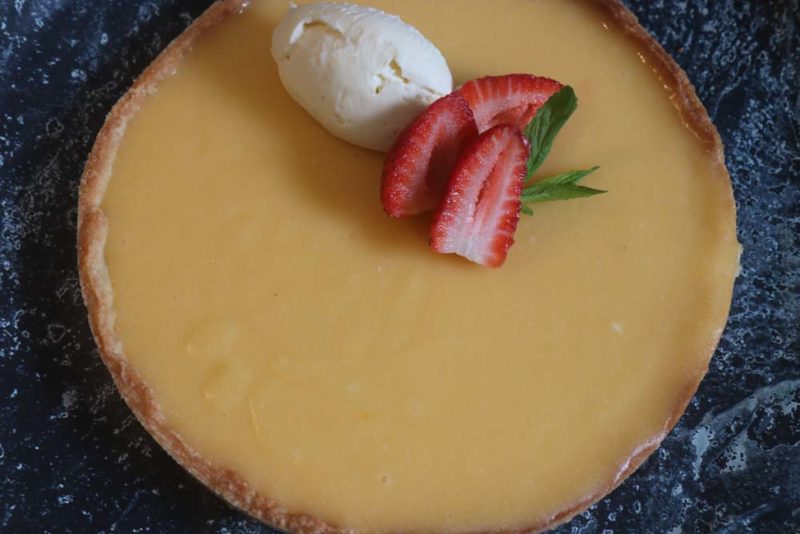
You can also make yourself some small lemon curd tarts. I really love this idea. They are great for spreading the love to multiple people or maybe just taking to dinner where everyone will get their own little dessert.
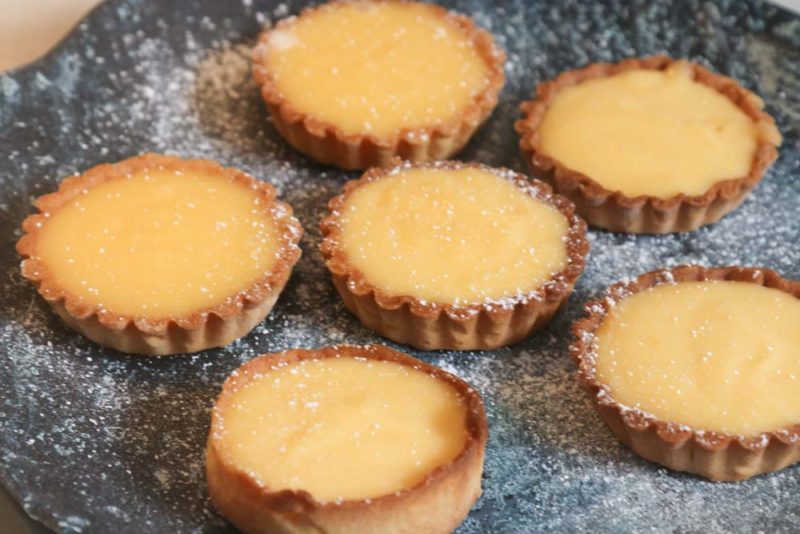
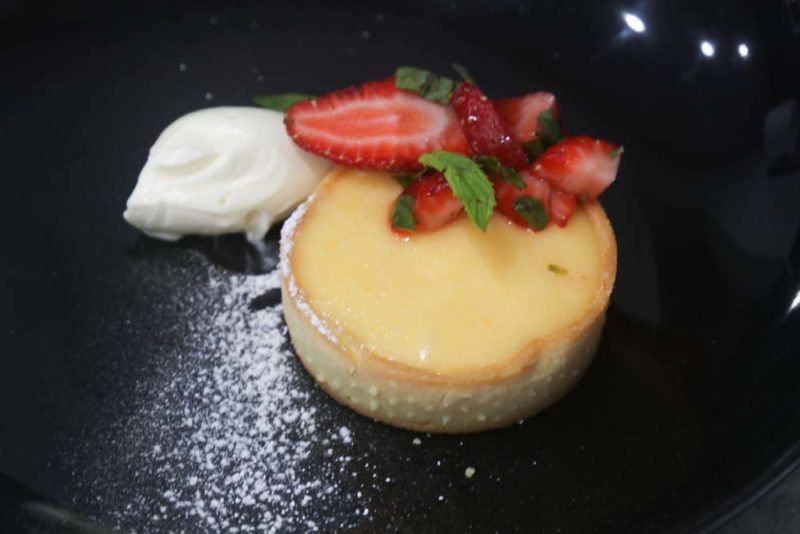
Lemon Tarts should be eaten on the day they are made. The pastry goes soggy after a few hours of filling with lemon curd. You can bake the pastry and make the curd and put the two together closer to when you serve if you want.
One of the secrets to a great tart is baking the pastry to a deep burnished brown. This means the pastry stays crisper for longer and doesn’t as easily absorb moisture from the filling. This stands for any tart or tart filling
Next secret? The pastry.
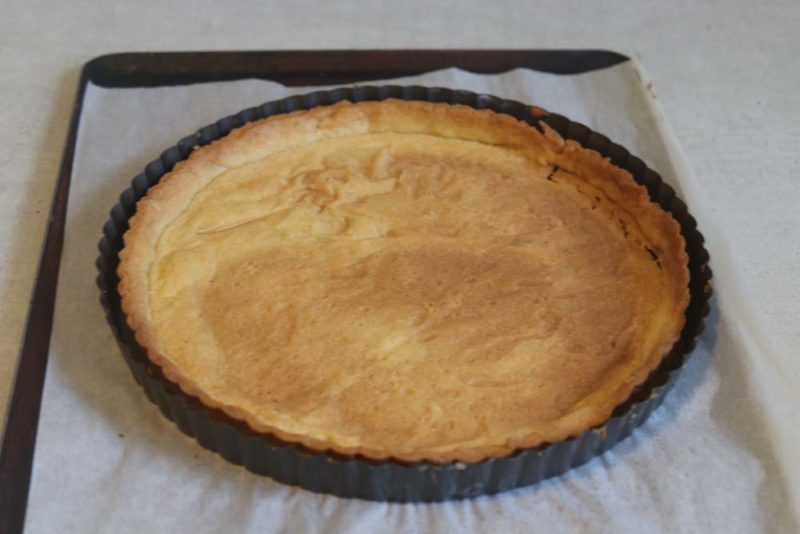
What’s the secret to great pastry?
- Pastry that is too wet and sticky will be tough. Always follow the directions if the recipe says don’t add all the liquid (or egg) at once
- Don’t overwork the pastry. One of the best ways to do this is to make it in a food processor. It’s fast, keeps it cool and it’s easy to see if it needs extra liquid added or not.
- Pastry needs to be well chilled after making and before rolling out
- Once chilled and nice and firm take it out of the fridge and let it sit on the bench to soften slightly before rolling.
- Roll out with a good dusting of flour running a palette knife under the pastry between rolls. Watch the flour though, too much flour will change the texture of your pastry.
- Always use a palette knife to loosen the pastry before trying to lift it into the tart case or between rolling. Pastry that doesn’t stick to the bench is easier to handle
- Always chill with the pastry (and all pastry) after rolling out and before baking.
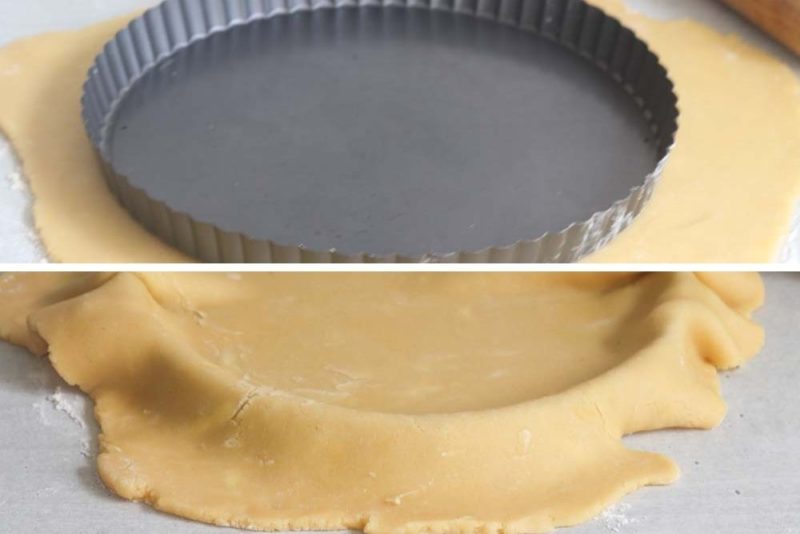
Check out this great guide to pastry making
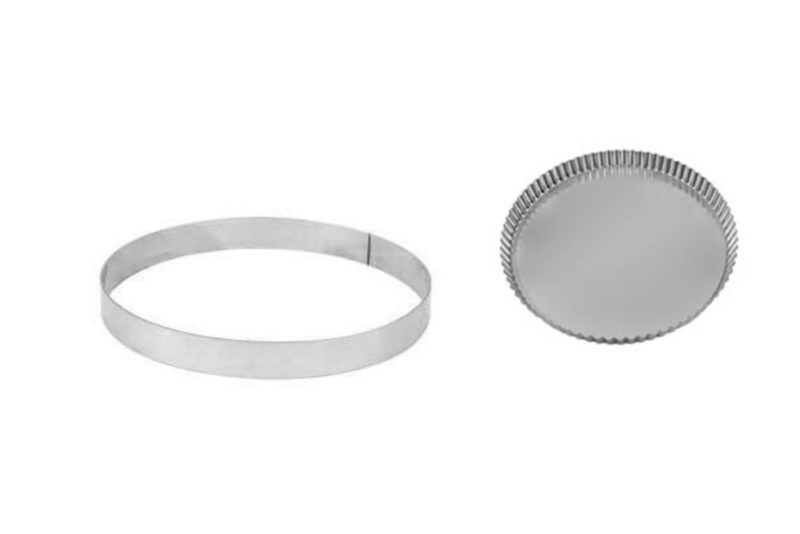
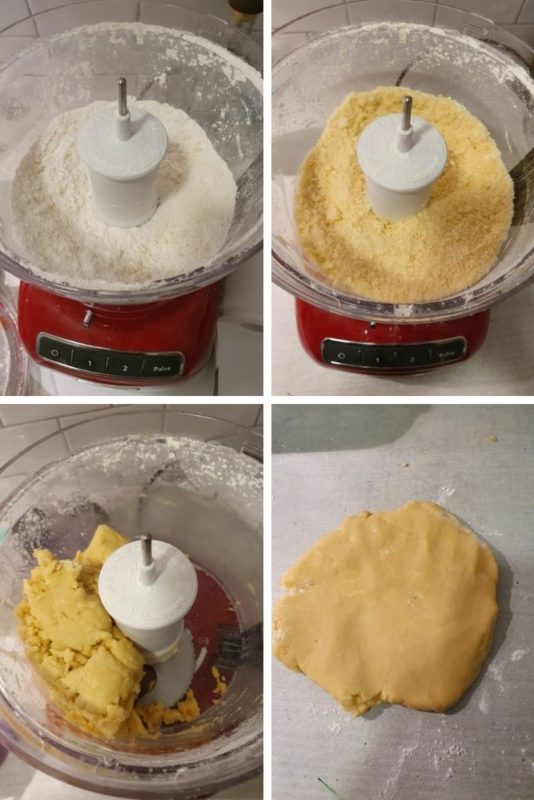
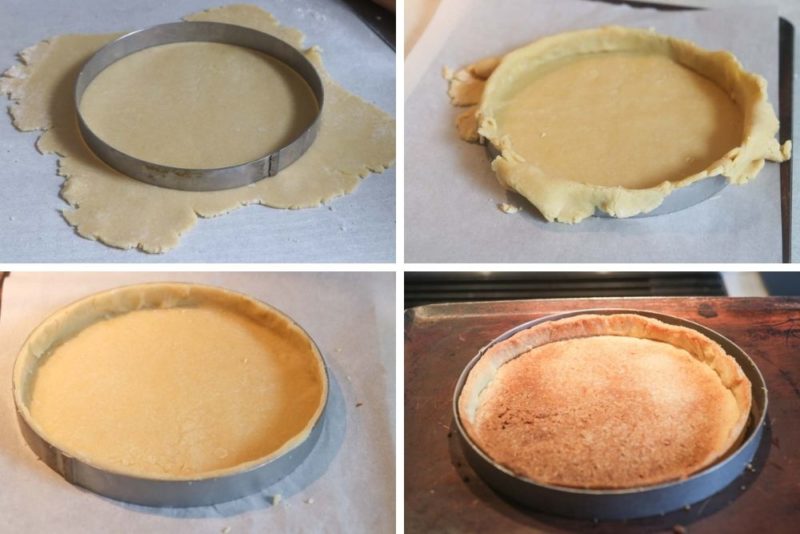
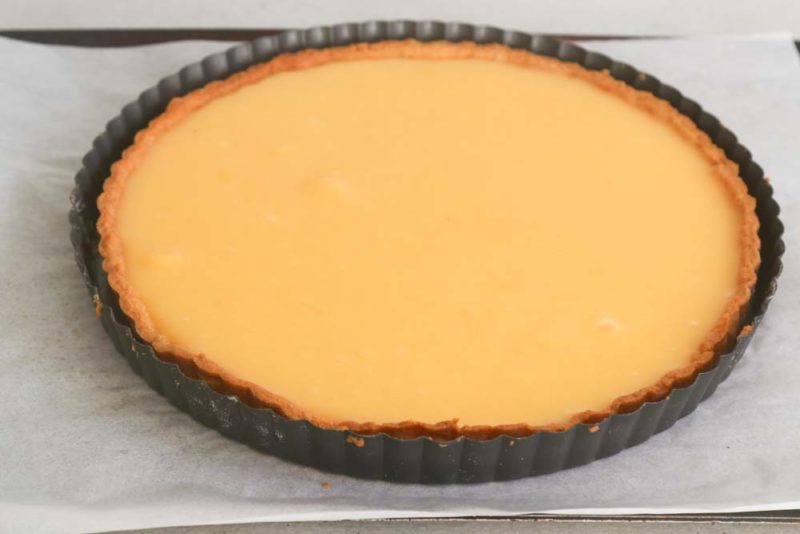
Making the lemon curd
This really is the ants pants of lemon curd. It uses eggs, butter, sugar, lemon juice, and in this case gelatine. Not all lemon curds have gelatine in them. In this curd, it does marry all of the ingredients together and sets them into a beautiful firm curd that can be cut.
The secret to cooking lemon curd is that it needs to be made over a double boiler. The trickiest part is taking it off the heat just as soon as it thickens up. The butter is then added and stirred through. The curd can be poured straight into a tart case or stored in a container for another time or another use!
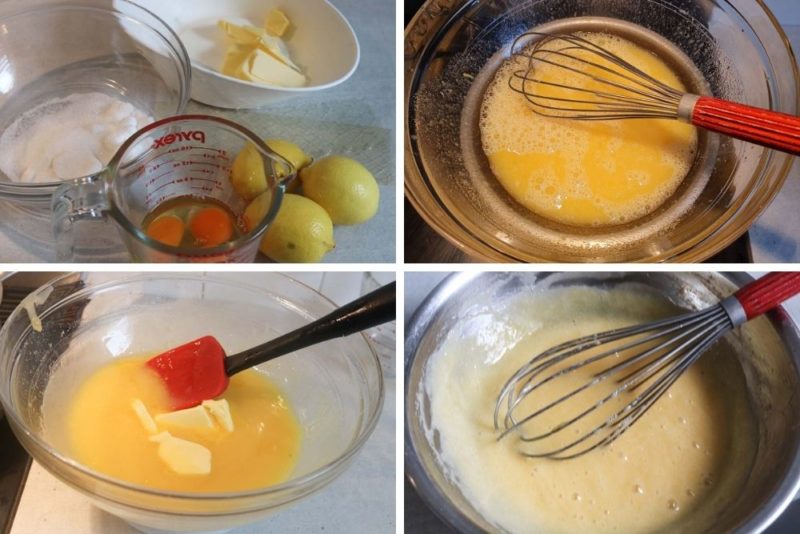
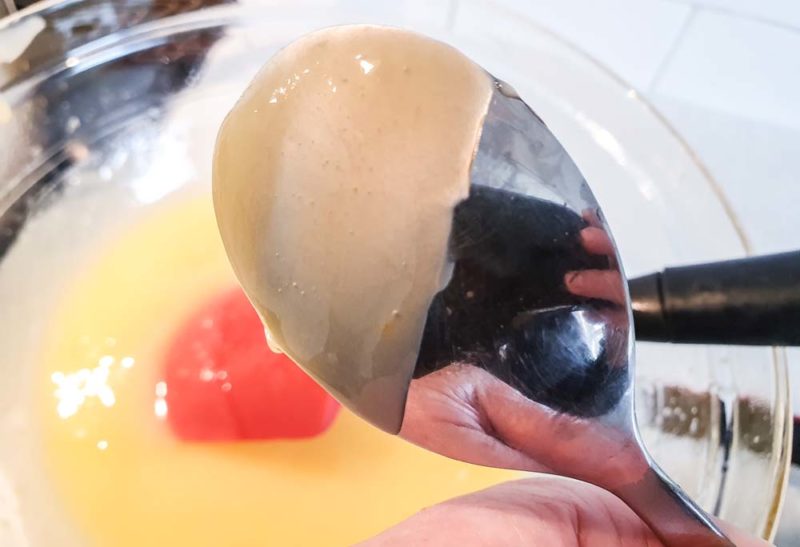
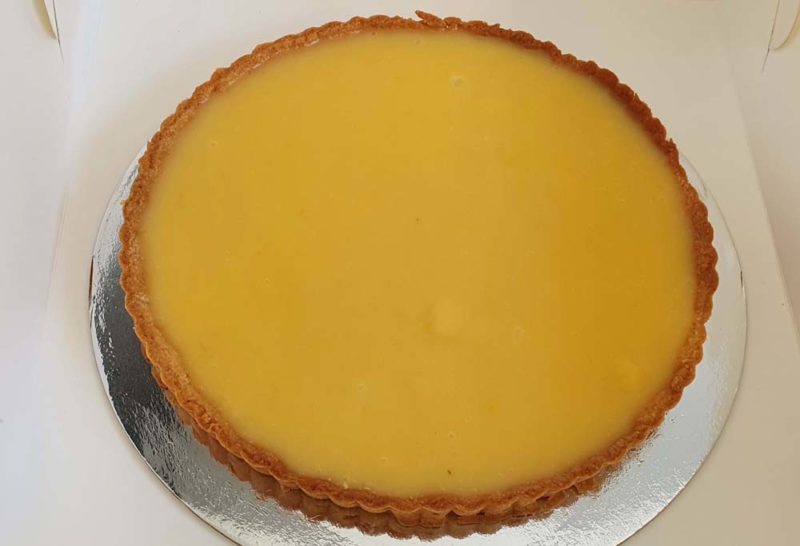
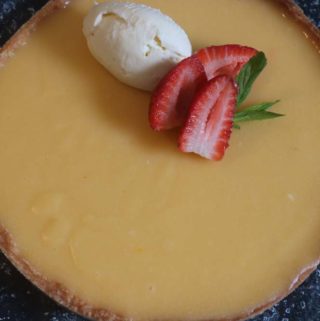
Lemon Tart made with delicious lemon curd
Deliciously deep in lemon flavour this tart contains no cream and doesnt need to be cooked once the lemon is poured into the case. Measurments are in Australian cup sizes
Ingredients
Pastry
- 240 gm flour, plain or 8.45 oz | 11/2 cups + 2 Tbsp
- 95 gm icing sugar, pure or 3.35 oz | 3/4 cup
- 120 gm butter, unsalted or 8.45 oz
- 50 gm egg, whole or Large egg size | 2.45 oz
- 5 ml cold water or 1 teaspoon
- 3 ml vanilla 1/2 teaspoon
Lemon Curd
- 150 ml lemon juice or approx 3 | 5.05 fl oz
- 150 gm egg or approx 3-4 eggs / 5.30 oz
- 120 gm caster sugar or 4.25 oz | 1/2 cup plus 1 Tbsp
- 75 gm butter or 2.65 oz
- 1.5 ea leaf gelatine or 1 teaspoon powdered gelatine
Instructions
Sweet Pastry
-
You will need a tart tin. The tin should be approx 3 cm deep (1.20 inches) and can be anything from 20 cm to 26 cm ( 7.5 in 10 in). Straight sided or fluted. If you have a deeper tart tin you will need to double the lemon curd recipe. More on that later.Set the oven 170 C.
-
Mix the egg, vanilla and a teaspoon of water. Whisk with a fork. Measure this mixture on the scales to 50 gm (or 2.45 oz)
-
Cut the butter into cubes and keep cold.
-
Sift the plain flour, and the icing sugar together and put it into the food processor and pulse.
-
Add the butter and mix it until it becomes crumbly. Take the lid off and add the egg and the vanilla paste and incorporate the ingredients. Mix only until it comes together in a ball.
-
Flatten into a disc. Refrigerate or freeze until firm. To roll out the pastry you can roll between two pieces of baking paper and then chill again before removing one side of the pastry and emptying it into the tart tin. Flatten down the pastry and make sure it is pushed into all of the sides well.
-
If you prefer to roll your pastry on the bench dust with a little flour and roll out the pastry until its bigger than your tart mold. Run a palette knife under the pastry and put both hands under it. Lift it up and put into the mold pushing into all the corners. Chill the pastry until firm.
-
Once chilled line the pastry with paper and fill with baking beans. Dry chickpeas are perfect for this) Set the oven to 170C and bake the pastry for 10 minutes. Remove the paper and continue to back for around 8 minutes or until quite golden brown. Take out of the oven and set aside
Lemon Curd
-
Dice the butter for the curd and allow it to soften. Set aside. Soak the gelatine in cold water until limp and squeeze out the water, set it aside. If using powdered gelatine put it into a small bowl and add 20 ml of cold water and stir, set aside.
-
Put the lemon juice, eggs, gelatine and sugar in a heatproof mixing bowl and stand the bowl over a pan of hot water. Whisk or preferably stir with a spatula continuously until the mixture starts to thicken. See notes***
-
When the lemon mixture is shiny, and coats the back of a spoon take off the heat immediately add the butter and whisk until incorporated. (This can be processed with the stick blender until smooth if you want). Cool to just warm.
-
Pour the curd into the tart case. Smooth out the top. Chill until firm, approximately 30 minutes.
-
If you want to make the tart at a later date, refrigerate the lemon curd. Reheat with 20 second bursts in the microwave stirring between each time until pourable. Pour the curd into the cooked tart and refrigerate
Notes
The curd should never boil. In fact, it shouldn’t get over about 70 C / 160 F. The curd is made with eggs and juice and will cook like scrambled eggs when overheated. So, to prevent this stir continuously.
You will notice the curd starts to look shiny as the sugar melts and it will start to thicken. It will feel noticeably more viscous but will not thicken greatly. It will coat the back of a spoon. The butter will cool the mixture down a bit. Once the curd is chilled it will set.
It is often better to stir rather than whisk the curd mixture as whisking creates too many bubbles and it is hard to see when it has thickened






More Stories
The Ultimate Work Desk Kit: From Eye Drops to Vicks Roll On
Essential Insights into Atlanta Insurance: Your Ultimate Guide
Transform Lives by Giving Plasma: A Comprehensive Guide